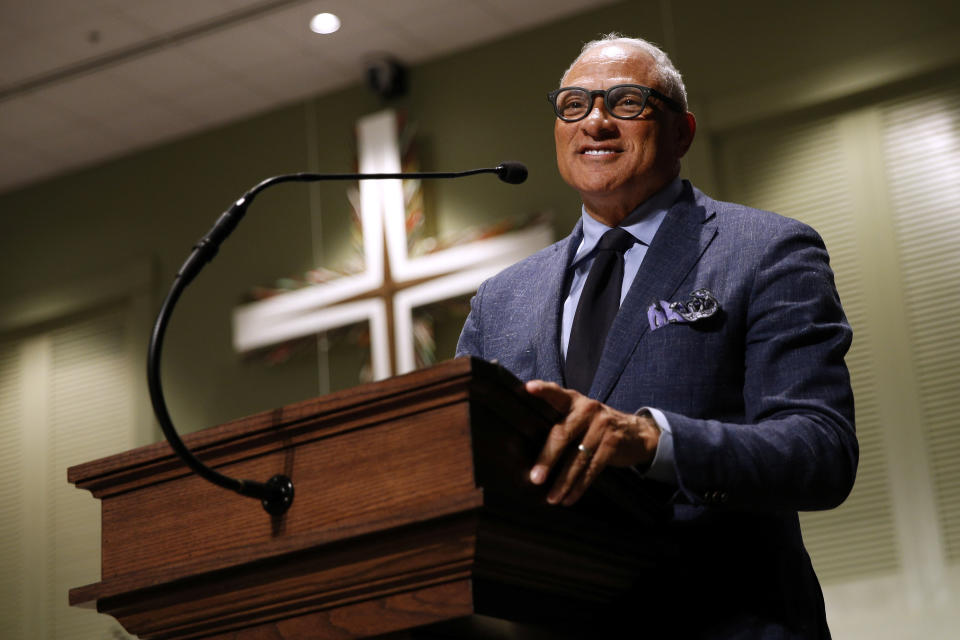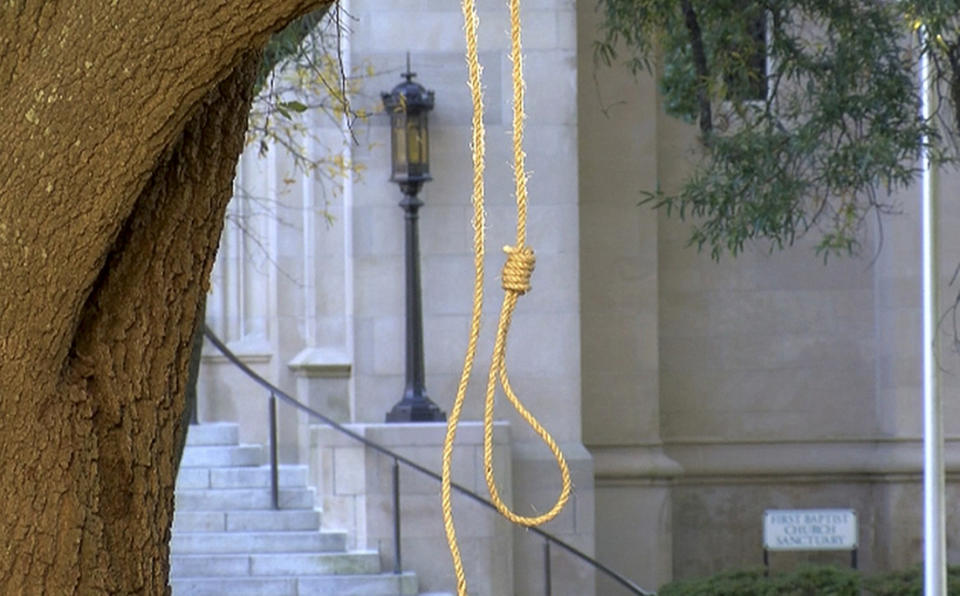The past isn’t past in Mississippi as voting begins in Senate contest dominated by race

JACKSON, Miss. — Capping a heated campaign fought largely on racial politics, Mississippi’s runoff election for U.S. Senate wound its way to a finish Tuesday after dueling election-eve rallies urged voter turnout in a race that went from safely Republican to too close to call.
On one side of Mississippi was President Trump, dispatched at the last minute for what Republicans described as a life-saving mission to bail out Sen. Cindy Hyde-Smith, a Republican appointee whose campaign to be the state’s first elected female lawmaker in Washington was thrown off course when she was captured making comments that invoked the state’s dark history of racism.
In two stops, Tupelo and Biloxi, Trump sought to change the subject and rally the GOP base in the state, which he won by 18 points two years ago. He cast the election as less about Hyde-Smith than about his own fate and agenda — an argument Republicans hoped would be enough to push the embattled Hyde-Smith across the finish line.
“This election’s about jobs and judges, borders and protecting the blessings of freedom and prosperity for our children,” Trump declared in Tupelo before a largely white crowd. “This is what it’s about.”
Across the state was Mike Espy, a former congressman and Clinton administration official who is vying to be the first Democrat elected to the Senate from Mississippi in nearly four decades and the first African-American since Reconstruction.
Espy spent the last hours before Election Day at a praise and worship service at a predominately African-American church in Jackson, where he delivered an impassioned speech recalling the racism he endured as a child growing up in rural Mississippi.

Speaking to a mostly black audience as part of his campaign’s intense effort to turn out the African-American vote ahead of Tuesday’s election, Espy cast himself as someone who tried to avoid race as an issue in the campaign and who has spent his career working to bridge lingering racial divisions in a state still reckoning with its Jim Crow past.
Blacks and whites may have come to America in “different ships,” Espy said, “but we are all on the same boat now.” He told the crowd he was running to represent “everyone — irrespective of race, irrespective of gender, irrespective of party, irrespective of religion. I want to be the vehicle of progress in Mississippi.
“Across the chasm of racial acrimony, we are just trying to rise up from all the noise, from all the division, from all the dysfunction,” Espy declared. “And make sure everybody in Mississippi knows: If we gonna rise, we gotta rise together.”
Espy’s speech came in the final hours of a tumultuous campaign for a seat that was regarded as safely Republican as recently as two weeks ago. But the runoff election was thrown into disarray when a video clip emerged earlier this month showing Hyde-Smith praising a cattle rancher at a campaign event in Tupelo by saying that if the rancher invited her “to a public hanging, I’d be on the front row.” To many, the comment invoked images of lynchings — vigilante killings, overwhelmingly of blacks, carried out by mobs to terrorize or impose extrajudicial punishment. The NAACP counts 581 lynchings in Mississippi between 1882 and 1968, the most of any state.

That comment was followed by another campaign remark in which she mused about making it “a little more difficult” for “liberal” college students to vote. A 2014 Facebook photo circulated of her in a Confederate Army hat as she visited the home of Confederate President Jefferson Davis, who lived out his final days in Biloxi. Her own history of attending a “segregation academy” — a private school created as an alternative to the integrated public schools — was publicized and got more attention after it was disclosed that she sent her own daughter to such a school.
Hyde-Smith, a former state senator and state agriculture secretary, seemed flummoxed by how to respond to the racial controversy. She issued a statement accusing her opponents of a political smear. But she didn’t initially apologize, and she dropped off the campaign trail almost entirely in the last week. Last Tuesday, in her one and only debate with Espy — previously the state’s first elected African-American member of Congress since Reconstruction — Hyde-Smith read from a carefully worded statement that seemed designed not to alienate her most conservative supporters.
“For anyone that was offended by my comments, I certainly apologize,” Hyde-Smith said. “There was no ill will.” She accused Espy of twisting her words and turning them “into a weapon” to be used against her.
“No one twisted your comments, because your comments were live; it came out of your mouth,” Espy shot back. “I don’t know what’s in your heart, but we all know what came out of your mouth.”
While Trump made no mention of the controversy on the stump Tuesday, he defended Hyde-Smith to reporters, calling her a good person and saying her apology was genuine. “I know where her heart is, and her heart is good,” Trump said.

How the race controversy will affect the race is unknown. While people on both sides say the politics in deeply conservative Mississippi favor Hyde-Smith, Republicans acknowledge the uproar has damaged her campaign and given Espy momentum that puts the seat in play. A GOP source told Yahoo News that internal polling had Hyde-Smith up by just five points. There was hope that Trump’s visit would help her, however, especially among ultra-conservative Republicans who had voted in the three-way general election for her Tea Party rival, Chris McDaniel, who had finished third. Some had threatened to sit out the election in protest.
On Monday, dozens of GOP operatives flooded the state, including staffers for the Republican National Committee and National Republican Senatorial Committee who fanned out to aid Hyde-Smith’s ground game. They were up against several Democratic groups who have been working on Espy’s behalf to get out the African-American vote, including in low-turnout areas like the Mississippi Delta.
On Monday night, Republicans were still predicting a narrow Hyde-Smith win. But another GOP operative with close ties to the national and state party wasn’t so sure. He pointed to the uncertainty of the African-American turnout but also to the open question of whether moderate Republicans might defect to Espy — or not vote at all in protest of Hyde-Smith’s racial views.
On Monday, Megan Millroy, a founder of the Mississippi-based Republican Women for Progress, issued a public letter calling Hyde-Smith “unfit” to represent the state in Washington. “I’m not saying you have to vote for Mike Espy, but I am saying that if you love our state and want to see it represented as best as it can, you should not vote for Cindy Hyde-Smith,” Millroy wrote.
In Jackson, there was another ominous sign of how heated the issue of race has become in the Senate contest. On Monday morning, police found several nooses hanging from trees on the grounds of the Capitol, with signs that appeared to criticize Hyde-Smith’s response to her “public hanging” remark.

“We’re hanging nooses to remind people that times haven’t changed,” one sign read, according to a photo posted on Facebook by the Mississippi Department of Public Safety, which is investigating the incident.
_____
Read more from Yahoo News:
Trump asks why Mueller hasn’t interviewed ‘hundreds’ of campaign staffers
George Conway: Republican Party has become a ‘personality cult’ under Trump
Trump administration defends asylum crackdown after judge’s ruling
An American killing: Why did the U.S. Park Police fatally shoot Bijan Ghaisar
Cory Booker: I will ‘take some time over the coming months’ to consider 2020 bid
PHOTOS: Migrants try to breach border at Tijuana — U.S. agents fire tear gas


